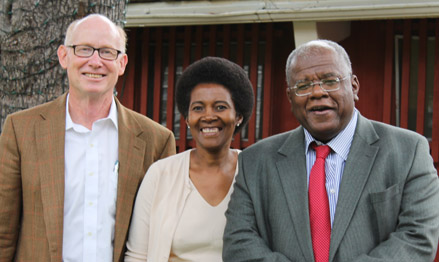Latest News Archive
Please select Category, Year, and then Month to display items
06 April 2018
Photo Rulanzen Martin
 From the left: Dr Thulisile Mphambukeli, leader of the BRICS research team that is exploring the political economy of water and food security, and her research partner, Dr Victor Okorie.
From the left: Dr Thulisile Mphambukeli, leader of the BRICS research team that is exploring the political economy of water and food security, and her research partner, Dr Victor Okorie.
A Brazil, Russia, India, China and South Africa (BRICS) delegation is to hold the 10th Annual BRICS Summit in the last week of May 2018 in Johannesburg. Dr Thulisile Mphambukeli, leader of the University of the Free State (UFS) research team alongside Dr Victor Okorie from the Department of Urban and Regional Planning, in collaboration with Prof Lere Amusan of North-West University, will ensure that water and food security is a prominent feature on the gathering’s agenda.
First, the project titled: “Exploring the political economy of water and food security nexus in BRICS and Africa” will debut at the National Institute for the Humanities and Social Sciences BRICS Think Tank Forum”.
According to Dr Mphambukeli, the key to water security is attitudinal change by means of education and conscientisation. This, she is adamant about, holds the potential to drive behavioural adjustments in the way society interacts with water.
Genetic and social approaches
Dr Okorie asserts that if strides towards reducing the demand for water were to be made, research efforts should be geared towards effecting changes at DNA level. Meaning we need to explore waterwise ways that enable crops and animals to thrive optimally.
The project also looks at social dimensions of water such as flushing a toilet. “Research activities on redesigning toilets, especially the urinal, where more than nine litres of water are used to flush less than one cubic centimetre of urine, are timely in the context of managing water and the food nexus crises,” said Dr Okorie.
Combining the genetic and social approaches would allow us to produce more with a smaller water footprint. This can be made possible by implementing precision agriculture which is about estimating and applying exact quantities of water and nutrients needed for the production of crops or the raising of livestock.
Paradigm shifting policies
Prof Amusan said the team intended to propose functional solutions that take the quality of water into consideration. Equitable production and distribution of water depends on endorsing policies of co-production between citizens, governments and the public sector. BRICS member states mutually consider water and food security as an issue of paramount significance, hence its feature on this prestigious summit’s agenda.
Meet Dr Mpho Jama, Prestige Scholar
2013-07-26
|
 |
Prof Jonathan Jansen, Vice-Chancellor and Rector (right), visited Dr Jama at UCLA on his recent trip to the USA where this photograph was taken with Prof Bill Worger of UCLA’s History Department. Dr Jama will return to the UFS in December 2013.
26 July 2013 |
Dr Mpho Jama, Fulbright scholar, is a lecturer in Health Sciences Education and a member of the Vice-Chancellor's Prestige Scholars Programme since 2011. She is currently hosted by the Graduate School of Education at the University of California Los Angeles (UCLA), funded by Fulbright.
At UCLA, Dr Jama is collaborating with the David Geffen School of Medicine on a research paper focusing on stress among medical students.
She also works in collaboration with the Higher Education Research Institute on psycho-social and spiritual support for students in higher education with specific emphasis on medical students. Dr Jama has joined the Research Apprenticeship Committee of the Institute and participates in its activities.